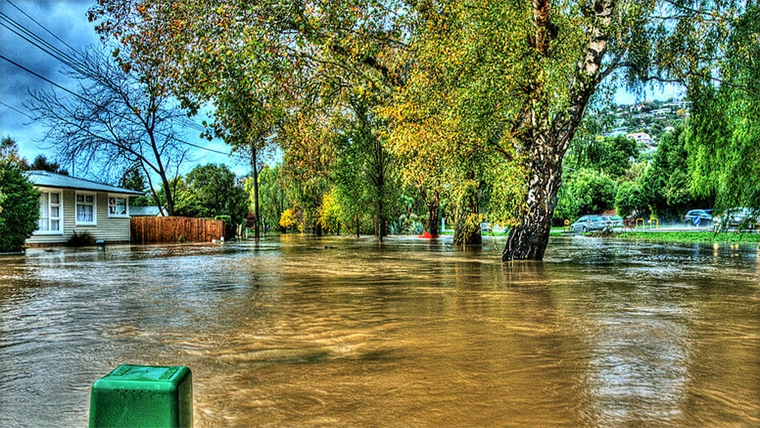
The risk to residential properties of flooding from New Zealand rivers could increase by almost half by 2050, according to analysis by reinsurance company Munich Re and property data company CoreLogic.
The research suggests that 11% of NZ's residential property by value is exposed to the risk of river flooding, but this could increase to 17% by 2050.
The analysis also suggested that some properties that have a relatively low risk of river flooding could be almost 10 times more likely to be flooded by 2050.
It found that about 5% of properties are currently exposed to the risk of river flooding in a once in 100 year event, meaning they have a 1% chance of being of being flooded in any given year.
But the analysis suggested their risk of being flooded could rise to 9% in any given year by 2050.
The report identified Otago properties as being particularly at risk from river flooding, with the region accounting for 5% of the country's total residential property value but 15% of the national river flood costs.
Other regions likely to face much greater risks of flooding by 2050 were Hawke's bay where the risk is estimated to increase by 33%, Manawatu-Whanganui +23% and Marlborough +21%.
"New Zealand will see an increase in both the frequency and severity of weather events due to climate change," Munich Re Australia Managing Director Scott Hawkins said.
"Weather-related disasters might in sum become as destructive to New Zealand as earthquakes.
"As the risk increases strongly for many regions, it is essential for communities, commercials and individuals to understand and manage their exposure to climate risk."
The comment stream on this story has now closed.
14 Comments
Beach front properties are desired, and buyers are prepared to pay.
Low lying towns by the rivers suffer from floods and people know about this.
It would be very interesting to hear about how many uninsured properties there are around the country and where they are.
My feeling is the insurance companies used the Chc EQ to exit insurance for low lying properties. I know for a fact they used a property sale as their exit point for a hill property which although it had only had minor damage was full of borer. They could have easily exited after the EQ, but it would have cost them a lot more, and they waited patiently, until the elderly owner died.
I live in a street where about a quarter of the houses are uninsured, and I guess with time, that percentage will increase.
The purpose of a flood plain is to flood. LWTF houses (Light Weight Timber Frame) on conc slabs are almost impossible to move, and expensive to build up above flood plains, which leaves the only reliable solution as houses on piles. And a resilient shape (not L shape), so they can easily be moved if required.
Can't get a mortgage without insurance
... if you buy a house near a body of water , the only mortgage available ought to be a floating rate ....
Boom-tsk!
I think you can borrow up to half the land, something like that, but that doesn't stop a landlord mortgaging his high and dry properties to the hilt, and using that to buy high yielding low lying rentals. It's easy too get a 10% net yield off these low lying properties
A rello was in process of relocating for work to Nelson. Had applied to rent a place and was awaiting the usual credit and reference checks to be done when the landlord pulled out. Now she wants $80 pw higher rent due to all the flood victims needing somewhere to live. And I bet she will be like every other landlord that claims to be renting at "below market rate".
Wow, salt of the earth...
You can still get fire, theft and earthquake insurance, just not flood insurance. (I think 🤔)
I note some countries have been trying to induce rainfall (seeding the skies) Id be keen on knowing if such activities have the ability to interfere with weather patterns elsewhere? Conversely is it possible to reduce the chance of severe weather by seeding? Can we say for sure weather patterns are not being tampered with elsewhere and it is altering outcomes elsewhere? Do we need international laws that prohibit such activities? Better put my tinfoil hat back on...lol
According to some in the Clownvoy yesterday, the government did exactly that to cause storms and disruptions to stop people getting to Wellington yesterday...
All that sinking land sure is an issue...
What the IPCC says about inland/river flooding.
SERIES: What the media won't tell you about . . . (substack.com)

We welcome your comments below. If you are not already registered, please register to comment
Remember we welcome robust, respectful and insightful debate. We don't welcome abusive or defamatory comments and will de-register those repeatedly making such comments. Our current comment policy is here.